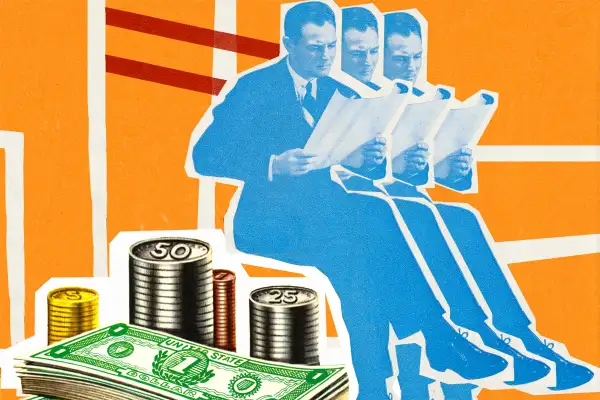As the Stock Market Erases Its Losses for the Year, Investors Suffer From Keeping Their Cash on the Sidelines
Money is not a client of any investment adviser featured on this page. The information provided on this page is for educational purposes only and is not intended as investment advice. Money does not offer advisory services.

If the market drop in March scared you into pulling money out of the market, you’re not alone.
Investors yanked $326 billion out of mutual funds and exchange-traded funds in March – that’s more than triple the fund outflows seen in October 2008, the previous record, according to Morningstar. Fleeing to safety, they dumped $685 billion into money market funds, which are considered a low-risk way to invest in high-quality, short-term debt instruments and cash.
But what a difference a few months makes: While the Standard & Poor's 500 dropped 20% in the first quarter, the index had fully recouped its loses for the year as of Monday's market close. Prior volatility could always return, but long-term investors should stay the course rather than jumping in and out, experts say.
Indeed, investors who get spooked by market conditions and move their cash to the sidelines may find that stocks recover quicker than they expected, and that they're behind where they would have been had they just left that money in the market, says Robert Scholes, associate wealth advisor at Cook Wealth Management Group. And they can be slow to jump back in.
“The apprehension doesn't fade as fast as the market recovers,” says Scholes.
That's because being out of the stock market can really cost you. If you missed the market’s top 10 best days over the last 20 years, your overall return was cut in half, according to J.P. Morgan Asset Management's most recent guide to retirement. The return on a $10,000 investment would have been $32,421 if you were fully invested, but drops to $16,180 if you missed those prime 10 days.
Having cash squirreled away may make you feel safe for the moment, but you certainly won’t see gains.
“Cash is not an investment,” says Mike Cocco, financial advisor with Equitable Advisors. “So anyone who thinks, ‘I only invest in cash and CDs’ – you're not investing. You’re just parking your money.”
CDs refer to certificates of deposit, a tool banks and credit unions offer that provides interest rate premiums to customers who agree to leave a deposit untouched for a predetermined period of time.
If investors put all their money in the bank via tools like CDs and bank accounts, they think they’re free of risk because they’re free of market risk, Cocco says. But they’re ignoring another type of risk: inflation. The cash sitting there might not decrease, but the person who put it there is losing purchasing power as the cost of retiree expenses – medical costs, for example, and even groceries – goes up.
The Society of Actuaries found that a gallon of milk that costs $3.75 would cost $6.79 in 30 years if the inflation rate is 2% – that goes up to $9.00 if the inflation rate is 3%. Meanwhile, health care inflation tends to rise at around 5% to 6% per year. Even the best high-yield savings accounts out there can't come close right now. For example, Money recently ranked Nationwide's My Savings account as one of the best around, and it offered 1.51% APY as of early June. That's a great rate for your emergency fund, not for your investments.
“You’re losing money each year, you’re just not necessarily seeing it on paper,” Cocco adds.
That said, the amount of cash you should have on the side changes as you grow closer to retirement. The farther out someone is from retirement and actually living off their savings, the more risk they can feel comfortable taking, Cocco says. While it’s important for everyone to have some cash in savings accounts for emergencies, people who are still more than two years out from retirement shouldn’t hold cash in their retirement accounts. Holding cash in those accounts is more for retirees who are actively taking out distributions, or will start very soon, he adds.
For those not nearing retirement, getting money off the sidelines and into the market ensures that, even if you’re experiencing the market’s scary days, you’re also experiencing its wins.
“There are three things that can happen to your money: it can go down, it can stay the same or it can go up,” Scholes says. “You’ll never be able to achieve your goal with the first two.”
More from Money:
The Best High-Yield Savings Accounts for 2020
Annuities Offer Retirees Peace of Mind in Choppy Markets. But They Come at a Cost

